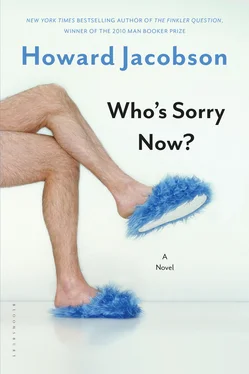‘I’ll write to you,’ Kreitman agreed.
‘What? Speak into this ear. I’m hard of hearing.’
‘I’ll write to you,’ Kreitman repeated.
‘Well, that’s what I said.’
‘Then I will.’
‘But you must promise you won’t write rubbish.’
‘I’ll try not to.’
‘Charlie used to write me the most stupid letters from school, always complaining about being cold and hungry. As if I wanted to hear any of that. He never had any news. Unless you call an ailment news. Or being bullied. Aren’t you a bit big to be bullied, I wrote back. But he said that was why they bullied him — because he was so big. I told him to put his head down and charge like a rhino, the way I did when girls bullied me at school. But I doubt he took any notice. Bullying one week, cold and starvation the next. Utter rubbish. I used to toss his letters in the bin the minute I’d read them.’
‘As long as you didn’t toss them in the bin before you read them,’ Kreitman said.
She threw him a baffled look. ‘Why would I do that?’
The other certainty about beautiful women, especially the flinty ones — they didn’t comprehend the rudiments of play. Or at least they didn’t comprehend Kreitman’s.
‘I’ll make a point of not writing to you about being cold or being hungry,’ he said.
‘Why? Are you cold and hungry?’
‘Some of the time,’ Kreitman heard himself saying.
‘Then come up to Twyford and see me. I can’t help you if you’re cold, my husband was always cold and I couldn’t help him — I think people just imagine they’re cold most of the time — but I can feed you up. I’ll give you fish pie, Charlie’s favourite. Do you like fish pie? Charlie used to eat so much fish pie when he was small he started to look like a fish. Finnie Haddock, his sisters called him, whenever they wanted to make him cry.’
‘What did you call him?’
‘Who?’
‘Charlie.’
‘The same. Finnie Haddock.’
‘And did Charlie’s father also like fish pie?’
‘I’m not sure I ever discovered what Charlie’s father liked. He was a headmaster, you know. Only of a miserable little state-maintained grammar school in the wastes of Leicestershire, to which I dutifully followed him and for which I was never thanked, but he loved it. Used to stand on his head outside his office on the first day of term, reciting Lewis Carroll. Then they changed it into a comprehensive overnight. That finished him. Never once stood on his head again. He was a weak person. Like Charlie in many ways. He cried a lot. Wouldn’t go out of the house. Just hid under the table in his raincoat, holding his briefcase, sobbing like a housemaid, the poor man. We sedated him in the end. Filled him full of happy pills. He turned the colour of fruit salad and sat grinning like the Cheshire cat. But at least that stopped the crying.’
‘I’m sorry,’ Kreitman said,
‘Why should you be sorry? It wasn’t your fault. I hope you’re not going to write me letters saying you’re sorry all the time.’
But Kreitman wasn’t able to reassure her because the hour to make the speeches and cut the cake had come.
‘Very clear,’ Mrs Merriweather told him when he’d finished his eulogy to the happy couple. ‘I heard every word.’ But throughout Charlie’s speech, she talked in a loud voice to Kreitman. ‘I’m amazed where he’s found the courage,’ she said.
‘To get married?’
‘Of course not. Doesn’t take courage to do that. Any fool can marry. To stand up and talk, I mean. He wouldn’t say boo to a goose when he was small. Not that he looks particularly confident now. Shaking inside, I suppose, like his father. I hope he doesn’t end up underneath the table.’
So, no, Kreitman didn’t begrudge his friend a second attempt at filiality. Besides, his own penchant for women his mother’s age hardly put him in a strong position to pass judgement. The two cases weren’t identical. Kreitman didn’t do helpless mutt. Kreitman did saucy whelp. He liked making a gift of his friskiness to women who had forgotten what friskiness looked like, or at least had not expected to have it chewing up their carpets again. Soon enough, to be sure, the eyes drooped and the chops fell and the young pup was moping about the house like an old dog. But dogs do that. They age. And bore easily. Either way, the short of it was that both men landed panting in their loved ones’ laps, but Kreitman moved more.
Up and down, side to side — not playfully but restively — then off…
Whereas Charlie stayed … And practised nice sex.
Pleasing to Kreitman that the match he’d made had worked well, if only in the still-together sense, which, when all is said and done, is probably the only measurement there is. Otherwise, he hadn’t paid much attention to it. A happy marriage in the still-together sense wasn’t a drama that beguiled him. And he didn’t suppose that his fractious marriage to Hazel — though also working well in the still-together sense — was of consuming interest to the Merriweathers. Occasionally his nostrils would fill with the parsnip odour of Charlie Kate’s kitchen-garden disapproval of ‘the way he lived’, but nothing was said. The nearest she came to a declaration wasn’t over women at all, but over Cobbett, the Kreitmans’ cat. Kreitman was at war with Cobbett on account of the way he arched his back against Kreitman’s shin bone the second Kreitman got out of bed. Until Cobbett hit upon this method of ingratiation, Kreitman had not thought of himself as a man with unusually sensitive tibia; but now his shins were like blackboards awaiting the shiny squeak of chalk. That there was an emotional no less than a physical aspect to this shrinking from the feather pressure of his own cat Kreitman didn’t doubt. Cobbett caught him out in an insufficiency: among all the other dishes on his menu of cravings, the cat wanted affection, and Kreitman, knowing his was not a nature that could turn affection on as from a tap, even supposing it had affection to give, felt as though his soul, with all its inadequacies, was being tickled open. So when Cobbett came asking on the stairs, quivering and death-rattling and making a horseshoe of his back, Kreitman did what he was not able to do when any human asked affection of him, and kicked. Hearing about this brutality from Hazel, who made a brave show of seeing the funny side of Cobbett taking the quick way down from the top of the house to the bottom, Charlie Merriweather threatened to turn Kreitman in to the RSPCA unless he either give her his word he would learn indifference, if love was beyond him, or better still give her the cat. Without discussing it with his daughters or his wife, Kreitman gave her the cat. Other than that, he wasn’t sure what Charlie thought of him as a paterfamilias or husband. In so far as the Merriweathers and the Kreitmans argued their couply differences out, they did so as it were by proxy, taking advantage of the mishaps of third parties.
‘I can forgive the wilfulness, the selfishness, even the conceit,’ was one of Charlie’s most recent pronouncements on her older sister’s erotic leap, at the age of forty-seven, into the arms of a man half her age, ‘but what I can’t turn a blind eye to is the silliness.’
‘Silliness?’ Kreitman wondered.
‘It’s silly of Dotty to go running round one day telling everybody how blissed out she is, and then to go running round the next slagging off Angus for acting unreasonably.’ (Angus being the husband who, partly for that reason, was proving to be every bit as pissed off as Dotty was blissed out.)
Over the years, Kreitman had met Dotty many times at the Merriweathers’ and had always been a little bit in love with her, firstly on account of her being an assistant to the deputy literary editor of a small-circulation journal — and Kreitman gorged on any company he could find that wasn’t purse- or luggage-yoked — and secondly on account of the heat of imminence she gave off. Anyone with a brain in his head, Kreitman thought, would have noticed that Dotty had so far not leapt for her erotic life only because no man of her acquaintance had so far opened his arms and shouted ‘Jump!’ A pity his own had been so full whenever he met her …
Читать дальше












